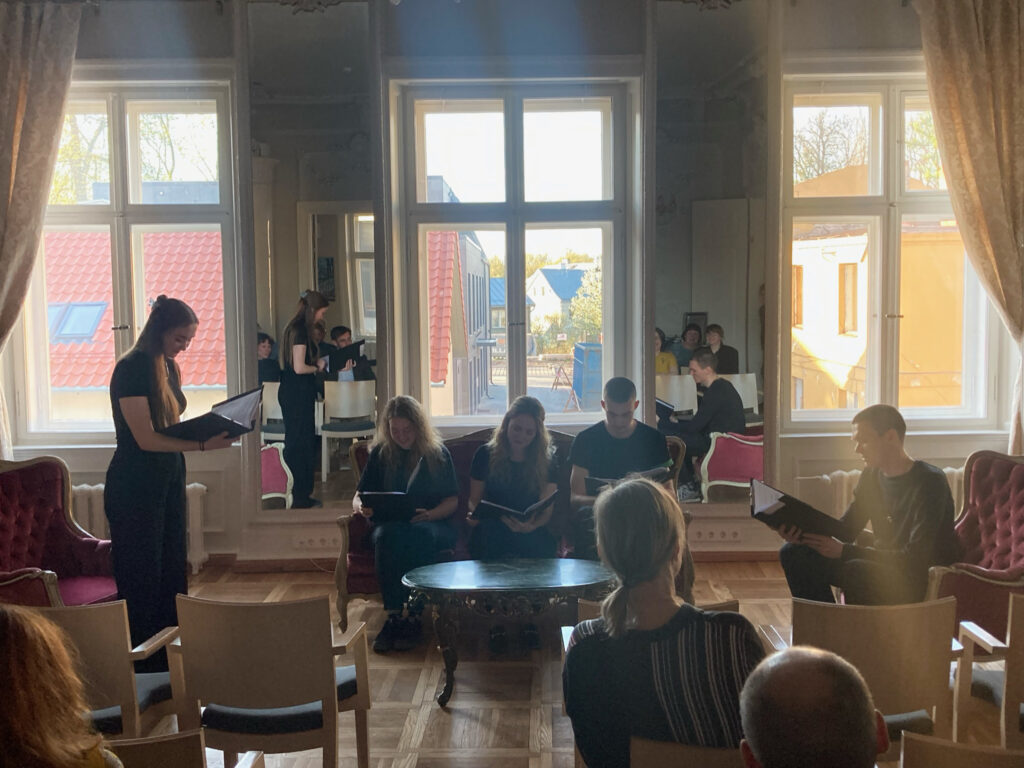
Conference

International Conference and Exhibition
Archives of Autonomy: Immanuel Kant and the Baltic Region
2-4 May 2024
The three-day conference will be devoted to commemorating the 300th anniversary of Immanuel Kant. It will encompass a one-day symposium on a central theme of Kant’s practical philosophy – self-determination – proceeding in the next two days to discuss the roots, relevance, and reception of various kinds of Kantian themes in the Baltic context. It will also include a guided tour at the University of Tartu Library’s exhibition of Tartu Kantiana as well as short presentations on the Kant-exhibition of the Latvian National Library and the digitalisation of Kant-related materials held at the Archives of the University of Königsberg at Olsztyn, coordinated by the Nordost-Institut Lüneburg.
The working languages of the conference are English and German. The first day is in English and the second and third day (predominantly) in German. Please register here to attend the conference.
2 May, University Senate Hall (Ülikooli 18-204)
10:00 Welcome
Eva Piirimäe (University of Tartu)
Her Excellency the Ambassador of the Federal Republic of Germany Anette Klein
Riho Altnurme (Vice Dean for Research, Faculty of Arts and Humanities, University of Tartu)
Iwan D’Aprile (University of Potsdam)
Individual and Political Self-Determination in Kant’s Philosophy: Perspectives, Context, Reception
Chair: Eva Piirimäe (University of Tartu)
10:30 Keynote lecture, Reidar Maliks (University of Oslo) Kant and his Followers on Self-Determination
Chair: Pärtel Piirimäe (University of Tartu)
12:00 Henri Otsing (University of Tartu): Freedom as Faculty – Sketching the Lineage of a Concept
12:45 Eva Piirimäe (University of Tartu): Kant on the Self-Determination of Peoples
14:30 Semyon Reshenin (University of Tartu): Schiller’s Critique of Kant’s “Republic of Devils”
15:15 Alexander Schmidt (Vanderbilt University): Obligation of the Weaker? Kantian Paradoxes of Self-Determination
Chair: Roomet Jakapi (University of Tartu)
16:15 Iwan D’Aprile (University of Potsdam): Salomon Maimon’s Topographical Dialectics of Self-Determination
17:00 Jonas Gerlings (University of Göttingen, Moritz-Stern Institute): Kant’s Public Sphere between St. Petersburg and Berlin
3 May, University Library (W. Struve 1), Tõstamaa seminar room
The Reception of Kant’s Philosophy in the Baltic States – between Archives, Exhibition, and Performative Appropriation
Chair: Meelis Friedenthal (University of Tartu)
10:30 Kant Reception in the Baltic States
Eduard Parhomenko (University of Tartu): Kant und Gottlob Benjamin Jäsche
11:15 Guided Tour at the University of Tartu Library’s exhibition “Kant 300 in Tartu: from Manuscripts to Heaven” (Eduard Parhomenko and Janika Päll, University of Tartu)
Chair: Liina Lukas (University of Tartu)
14:30 Presentation on the Kant-Exhibition at the Latvian National Library (Dagnija Baltiņa, Latvian National Library)
15:15 Presentation on the Digitalisation of Kant-related materials held at the Archives of the Albertina University of Königsberg at Olsztyn (Martin Walter and Agnieszka Pufelska, Nordost-Institut Lüneburg)
4 May, Von Bock House (Ülikooli 16, entrance from courtyard)
Kant’s Philosophy in Latvian-German Dialogue – Projects to Historicise and Make Constructive Use of His Ideas
Chair: Kaspar Renner (University of Potsdam)
10:00 Elvīra Simfa (University of Latvia): Alien Kant:
The History and Future of Kantian Ideas in Latvia
11:00 Raivis Bičevskis (University of Latvia): Vernunft in Riga: Kant im Spiegel der noch nicht veröffentlichten Vorlesungsmanuskripte in Lettland
Chair: Raivis Bičevskis (University of Latvia)
12:15 Klaus Neugebauer (Heidegger-Gesellschaft): Heideggers Kantbuch im Kontext der Rigaer Vorlesungen. Beispiel einer Grundlegung der Metaphysik
13:00 Kaspar Renner (University of Potsdam): Kritik und Eigensinn: Kluge/Negts „Kant Kommentare“ (2023)
The conference is funded by the Estonian Research Council’s research grant PRG942 „Self-Determination of Peoples in Historical Perspective“, the Institutional partnership in German studies, “The Shared Cultural Heritage in Germany and the Baltics” between the University of Tartu (German Studies and Comparative Literature) and University of Potsdam (German Studies), as well as the Nordost-Institut Lüneburg, in collaboration with the Estonian Goethe Society and the Federal State Brandenburg.
Photos: Kaspar Renner








